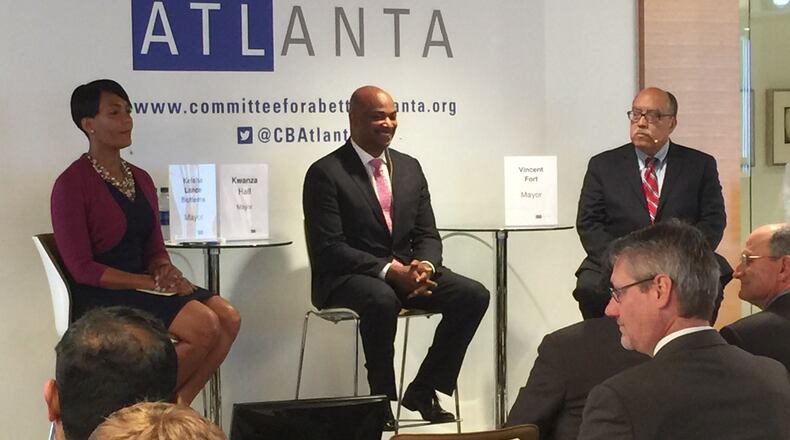Three candidates hoping to succeed Kasim Reed as Atlanta’s next mayor say the city may be reaching its ceiling on sales tax increases while two others said they are open to the idea of a metro area casino.
“I am open to the conversation, but I think it is highly unlikely that I could be convinced that a gaming facility downtown would be the appropriate thing for the city,” Peter Aman, former COO for the city of Atlanta under Reed, said of bringing casinos to Atlanta. “Great cities generally do not have downtown gaming.
“I do think, however, we should examine the possibility of gaming out by [Harstfield-Jackson International] airport,” he said.
City Council President Ceasar Mitchell said he supports a referendum that will let voters decide. But any casino must first prove it will complement Atlanta’s arts community, not hurt it.
The two men and nine others hoping to land the city's top job in November met Thursday to pitch their credentials to members of the Committee for a Better Atlanta, a coalition that advocates on behalf of the business community.
Those in attendance also included former Atlanta City Councilwoman Cathy Woolard, Fulton County Commission Chairman John Eaves, state Sen. Vincent Fort, former Atlanta Workforce Development Agency head Michael Sterling and Atlanta City Councilmembers Keisha Lance Bottoms and Kwanza Hall. Atlanta City Councilwoman Mary Norwood had a prior engagement and was not able to attend, her campaign said.
The CBA also included candidates Laban King, Elbert “Al” Bartell and Debra Ann Hampton, who say they have been overlooked in other forums.
The questions took on a broad number of topics, including transportation, police recruitment and retention, education, NPU's and homelessness.
But there was a catch. The candidates, who took to the stage in groups of three or four, only had 30 seconds to respond.
When asked what she would do about housing affordability, Woolard said she would create a cabinet-level position to address the issue. The city needs to determine what housing choices make sense in neighborhoods and the extent of the need.
“We would access what those numbers are and then employ private sector incentives,” she said.
Bottoms, Hall and Fort said there is a limit to how high Atlanta’s sales taxes should go. Reed has proposed a one-tenth of a penny increase in the city’s sales tax to support the arts. That would add to the nine-tenths of a penny increase Atlanta voters agreed to last year for MARTA improvements and the purchase of additional property for the Atlanta BeltLine.
The city’s sales tax is now 8.9 percent.
Bottoms said there is a price to creating a great city with a vibrant arts community, but that city leaders have to demonstrate its value if it wants residents to dig deeper in their pocketbooks to pay for it.
“As long as we are good stewards of the money, people will support funding,” Bottoms said.
But Fort said there needs to be a process in place to make sure the proceeds are evenly distributed. He said he is concerned that not every community will see the benefits of the transportation spending.
“There is a healthy skepticism in the city of Atlanta in many neighborhoods about whether the bonds from the referendum and the two T-SPLOSTs have been used correctly for all parts of the city,” he said.
MYAJC.COM: REAL JOURNALISM. REAL LOCAL IMPACT.
The AJC's Leon Stafford keeps you updated on the latest in the Atlanta mayoral race and everything else going on at City Hall. You'll find more on myAJC.com, including these stories:
Never miss a minute of what's happening in Atlanta politics. Subscribe to myAJC.com.
About the Author
Keep Reading
The Latest
Featured



